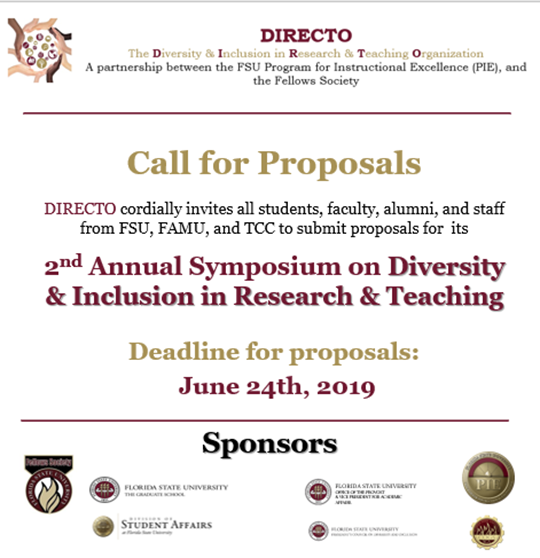Call For Proposals: DIRECTO Fall Symposium
2nd Annual Fall Symposium on Diversity & Inclusion in Research & Teaching
CALL FOR PROPOSALS & SAVE THE DATE
DIRECTO, the Diversity & Inclusion in Research & Teaching Organization at FSU, cordially invites all students, faculty, alumni, and staff from FSU, FAMU, and TCC to submit proposals for the Second Fall Symposium on diversity and inclusion.
Submit Abstracts (After Reviewing Guidelines Below) Using This Form
Deadline to Submit Abstracts: June 24th, 2019
Notifications of acceptance will be sent in mid-July
Symposium date & location/Save the Date: September 27th, 2019, 9-5pm at Turnbull Conference Center
DIRECTO’s Annual Fall Symposium seeks to promote constructive dialogue and provide participants opportunities to discuss issues surrounding diversity, inclusion, and equity. More importantly, we want attendees and participants to walk away from the event with tangible ways to promote diversity and foster inclusion in their research projects and teaching methods.
The symposium is supported by the President’s Council on Diversity & Inclusion, the Office of the Provost and Executive Vice President for Academic Affairs, the Division of Student Affairs, the Congress of Graduate Students (COGS), and the Graduate School at Florida State University.
Interested parties should submit a 150-250-word abstract describing a breakout session or poster that addresses a specific element of diversity and inclusion and how it relates to teaching and/or research. Participants are encouraged to think “outside-the-box” for their presentation structure and review suggestions for presentation formats below.
Possible breakout session structures include talking circles, themed paper presentations, panel discussions, roundtables, workshop or interactive sessions, case studies, posters on display, or something else (see descriptions of presentation formats below).
Possible poster/table presentations include classic conference poster, table with handouts, organization representatives seated at a table, or short interactive games/giveaways. Project goals/objectives, methodology, results/findings, future work and other discussion should be presented in terms that can be understood by a general audience. We strongly encourage the use of tables, photographs, diagrams, charts, and other graphics to help convey important and relevant information.
Abstracts may address: How can we turn theory on diversity and inclusion into practice? How can we turn our discussions on this topic into making tangible changes in our classrooms and research to make these teaching spaces and research practices more inclusive and equitable? Topic suggestions include, but are not limited to:
- Inclusive teaching and universal design
- Diversity in content, materials, and ideas
- Issues of race, gender, sexuality, ability, size, class, status in teaching and/or research
- Overlapping issues of diversity and inclusion in teaching and research
- International students, teachers, researchers and cultural concerns
- Issues of identity in teaching and/or research
- Hidden and implicit biases
- Ways that a focus on diversity and inclusion can promote research and/or teaching developments
- Going beyond the “diversity statement” — making long term changes
Note: If your proposal is accepted you are required to attend one informational session in advance of the Symposium
Descriptions of possible breakout sessions:
| Talking Circles
Talking Circles offer an opportunity to meet other participants with similar interests and concerns. Talking Circles are based on broad thematic areas and then engage in extended discussion about the issues and concerns the participants feel are of utmost importance to that segment of the community. Questions like “Who are we?”, ”What is our common ground?”, “What are the current challenges facing society in this area?”, “What challenges do we face in constructing knowledge and effecting meaningful change in this area?” may guide the conversation. Submissions should include a description of the topic and who will be guiding/facilitating the Talking Circle.
|
|
| Themed Paper Presentations
Paper presentations are grouped by general themes or topics into sessions comprised of two to four presentations followed by group discussion. Based on the size of the group each presenter in the session makes a formal 10-15 minute presentation of their work; Q&A and group discussion follow after all have presented. Session Chairs introduce the speakers, keep time on the presentations, and facilitate the discussion. |
|
| Panel Discussions
Panel discussions are organized by a group of colleagues who wish to present various dimensions of a project or perspectives on an issue. Three or five short formal presentations are followed by commentary and/or group discussion.
|
|
| Roundtable Discussion
For work that is best discussed or debated, rather than reported on through a formal presentation, these sessions provide a forum for an extended “roundtable” conversation between a facilitator and a small group of interested colleagues. Summaries of the facilitator’s key ideas, or points of discussion, are used to stimulate and guide the discourse.
|
|
| Workshop/Interactive Session
Workshop sessions involve extensive interaction between presenters and participants around an idea or hands-on experience of a practice. These sessions may also take the form of a staged conversation, dialogue or debate – all involving substantial interaction with the audience.
|
|
|
Innovation Case Studies Teachers, researchers, or other community present research or scenarios for the basis of discussion or problem-solving. All presentations should be grounded in presenter’s research or teaching experience.
|
|
|
Poster Sessions Poster sessions present preliminary results of works in progress or projects that lend themselves to visual displays and representations. These sessions allow for engagement in informal discussions about the work with interested delegates throughout.
|
*Adapted from the Diversity in Organizations, Communities & Nationals Conference Call – http://ondiversity.com/2019-conference/
Questions? Contact us at fsudirecto@gmail.com;
DIRECTO’s website: https://gradschool.fsu.edu/directo

